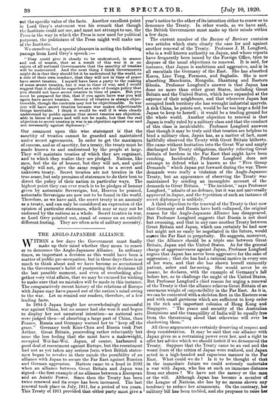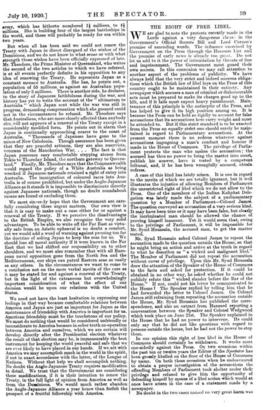THE ANGLO-JAPANESE ALLIANCE.
WITHIN a few days the Government nuist finally make up their mind whether they mean to renew or to denounce the Anglo-Japanese Alliance. In ordinary times, so important a decision as this would have been a matter of public pre-occupation, but in these days there is so much to think about and we have become so accustomed to the Government's habit of postponing their decisions till the last possible moment, and even of overlooking alto- gether very vital affairs, that we may be excused for wishing to make sure that no mistakes will be made in this instance. The comparatively recent history of the relations of Europe with Japan may have passed out of the nation's mind owing to the war. Let us remind our readers, therefore, of a few leading facts. In 1894-5 Japan fought her overwhelmingly successful war against China, but no sooner had she won it and begun to display her not unnatural intention—as national acts were judged then—of absorbing a large part of China, than France, Russia and Germany warned her to "keep off the grass." Germany took Kiao-Chau and Russia took Port Arthur. Great Britain, proceeding rather reluctantly but none the less feeling that she must have a makeweight, occupied Wei-hai-Wei. Japan, of course, harboured a good deal of resentment against Europe, but the resentment had not as yet taken any serious form when British states- men began to revolve in their minds the possibility of an affiance with Japan to secure the Far East against Russian and German aggression. Matters came to a head in 1902 when an alliance between Great Britain and Japan was signed—the first example of an affiance between a European and an Asiatic Power. Since then the Treaty has been twice renewed and its scope has been increased. The last renewal took place in July, 1911, for a period of ten years. This Treaty of 1911 provided that either party must give a year's notice to the other of its intention either to renew or to denounce the Treaty. In other words, as we have said, the British Government must make up their minds within a few days. The current number of the Review of Reviews contains two articles which state clearly the case for and against another renewal of the Treaty. Professor J. H. Longford, who is a well-known authority on Japan, and whose reports have frequently been issued by the Foreign Office, tries to dispose of the usual objections to renewal. It is said, for instance, that Japan is ambitious and aggressive, and is in all essentials the Germany of the East. She has absorbed -Korea, Liao Tung, Formosa, and Saghalin. She is now absorbing Manchuria, Mongolia, Shantung and Eastern Siberia. Professor Longford's answer is that Japan has done no more than other great States, including Great Britain and the United States, which have expanded at the expense of their neighbours, and that wherever Japan has occupied fresh territory she has wrought industrial marvels. A rich China, he points out, would be far too large a field for Japan to keep to herself ; it would be a trading ground for the whole world. Another objection to renewal is that Japan is really ruled by a military class and that the conduct of this class is incalculable. Professor Longford answers that though it may be truly said that treaties are helpless to bind a military class, Japan has, an a matter of fact, most faithfully observed the Treaty with Great Britain hitherto. She came without hesitation into the Great War and amply discharged her Treaty obligations, thereby relieving Great Britain of burdens in the Far East that might have been crushing. Incidentally, Professor Longford • does not attempt to defend what is known as the "Five Group Demands "which Japan put forward during the war. These demands were really a violation of the Anglo-Japanese Treaty, but an appearance of observing the Treaty was maintained by sending an incomplete account of the demands to Great Britain. "The incident," says Professor Longford, " admits of no defence, but it was not universally approved in Japan, and the fepetition of such an instance of secret diplomacy is unlikely." A third objection to the renewal of the Treaty is that now that Germany and Russia have both collapsed, the original reason for the Anglo-Japanese Alliance has disappeared. But Professor Longford suggests that Russia is. not dead but swooning, and that in any case another Treaty between Great Britain and Japan, 'which can certainly be had now but might not so easily be negotiated in the future, would • seceire the Far East in perpetuity. He suggests, moreover, that the Alliance should be a triple one between Great Britain, Japan and the United States. As for the general charge of aggressiveness against Japan, Professor Longford argues that Japan has never been aggressive for the sake of aggression ; that she has had a rational motive in every one of her wars, and that she has shown herself eminently patient, sober and far-seeing. She would never be so insane, he declares, with the example of Germany's fall before her, as to challenge the might of the United States. But Professor Longford's chief reason for urging a renewal of the Treaty is that the affiance relieves Great Britain of an enormous weight of responsibility in the Far East. As it is, we can be contented with a skeleton fleet in the Eastern seas and with small garrisons which are sufficient to keep order in the rich and important colonies of Hong Kong and Singapore. "The peace and security of the Australian Dominions and the tranquillity of India will be equally free from the threatening cloud that otherwise will ever be shadowing them."
All these arguments are certainly deserving of respect and deep consideration. It may be said that our alliance with Japan gives us a restraining power over her, and a right to offer her advice which we should forfeit if we denounced the Treaty. Suppose that the Treaty came to an end and the worst fears of the critics of Japan were realized, and Japan acted in a high-handed and rapacious manner in the Fax East. What could we do ? Is it to be thought of that in the immediate future we could seriously undertake a war with Japan, who lies at such an inn-I-tense distance from our shores ? We have not the money or the Jaen or the will. Although Japan has become a member of the League of Nations, she has by no means shown any tendency to reduce her armaments. On the contrary, her military bill has been trebled, and.she proposes to raise her army, which has hitherto numbered If millions, to 4f Pillions. She is building four of the largest battleships in the world, and these will probably be ready for sea within two years.
But when all has been said we could not renew the Treaty with Japan in direct disregard of the wishes of the Dominions, and we do not know in what sense or with what etrength those wishes have been officially expressed of late. Mr. Theodore, the Prime Minister of Queensland, who writes the second of the two articles to which we have referred, is at all events perfectly definite in his opposition to any idea of renewing the Treaty. He represents Japan as a constant menace to Australia. She has, he points out, a population of 55 millions, as against an Australian popu- lation of only 5 millions. There is another side, he declares, to the story of Japanese faithfulness during the war, and history has yet to write the account of the' ultimatum to Australia" which Japan sent while the war was still in progress, demanding compensation which she guessed could not in the circumstances be refused. Mr. Theodore says that Australians, who are more closely affected than anybody else, will not approve of a renewal of the Treaty except in a considerably modified form. He points out in alarm that Japan is continually approaching nearer to the coast of Australia. "Thousands of Japanese have gone to the mines of New Caledonia. Though assurance has been given that they are peaceful artisans, they are also reservists, veterans of the Manchurian War. . . . The fact is that Japan possesses easy comfortable stepping stones from Tokio to Thursday Island, the northern gateway to Queens- land." Finally, Mr. Theodore says that the Commonwealth would regard the policy of a White Australia as being wrecked if Japanese nationals retained a right of entry into Australia. The immigration of coloured races into Aus- tralia is of course prohibited, but under the Anglo-Japanese Alliance as it stands it is impossible to discriminate directly against Japanese nationals, though no doubt roundabout means are found of excluding them.
We most sincerely hope that the Government are care- fully considering these urgent matters. Our own view is that it is easy to make out a case either for or against a renewal of the Treaty. If we perceive the disadvantages to the British Empire, we also recognize the very solid advantages. To be able to write off the Far East as virtu- ally safe from an Asiatic upheaval is no doubt a comfort, yet we would add a word of warning against pressing too far the doctrine of asking Japan to keep the seas for us. We should lose all moral authority if it were known in the Far East that we had shifted our responsibility on to other shoulders, and we must also remember that with all Euro- pean naval opposition gone from the North Sea and the Mediterranean, our ships can patrol Eastern seas as easily as any others. In the circumstances we want to come to a conclusion not on the mere verbal merits of the case as it may be stated for and against a renewal of the Treaty, but in the light of the extraneous but overwhelmingly important consideration of what the effect of our decision would be upon our relations with the United States.
We need not have the least hesitation in expressing our feelings in that way because comfortable relations between America and Japan are just as important for Japan as the maintenance of friendship with America is important for us. American friendship must be the touchstone of our policy. We must do nothing that would be considered unfriendly or inconsiderate to America because in sober truth co-operation between America and ourselves, which we are certain will develop directly after the Presidential election whatever the result of that election may be, is immeasurably the best instrument for keeping the world peaceful and safe that we are ever likely to have placed in our hands. If we at with America we may accomplish much in the world in the spirit, if not in exact accordance with the letter, of the League of Nations. Without that help we shall accomplish nothing. No doubt the Anglo-Japanese Treaty requires modification in detail. We trust that the Government are considering these modifications, if it is their intention to renew the Treaty, in the full light of opinion from America as well as from the Dominions. We would much rather abandon the Anglo-Japanese Alliance a year hence than forfeit the prospect of a fruitful fellowship with America.



































 Previous page
Previous page